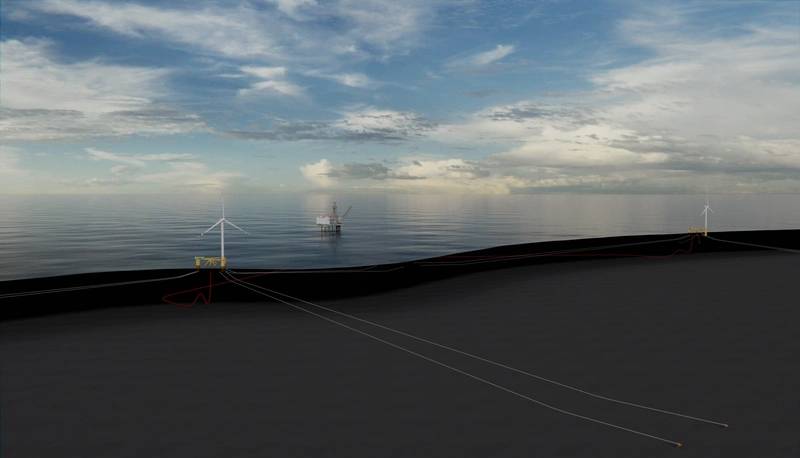DNV Grants AiP for Odfjell Oceanwind's Floating Wind Foundation Designed for up to 15MW Turbines
Classification society and assurance provider DNV has awarded Odfjell Oceanwind an Approval in Principle (AiP) for its new Deepsea Semi floating wind foundation design.
The Deepsea Semi floating wind foundation design has been developed for use in floating wind farms and for off-grid applications including temporary electrification of oil and gas installations in harsh environments.

The Deepsea Semi foundation is dimensioned for up to 15MW wind turbine generators and has been developed for low-cost, industrial mass-production.
The design basis includes all areas for floating wind farms currently in planning in the North Atlantic region, including Scotwind and Utsira Nord, and covers a range of 60 to 1300 meters water depth. It is optimized for Siemens Gamesa’s SG 11.0-200DD and SG 14.0-222DD offshore wind turbines and is undergoing classification and certification from DNV on that basis. The AiP is part of this ongoing class approval process involving Odfjell Oceanwind, Siemens Gamesa and DNV.
“This AiP marks an important milestone for us,” said Per Lund, CEO of Odfjell Oceanwind. “Building on the long-term relationship with DNV, we have chosen to work closely with them from day one in our development and will continue to do so for the class approval and certification of our fleet of Mobile Offshore Wind Units. The mindset from shipping that we share with DNV has proven very valuable for us in creating a product and service for floating wind power that scales much faster than what we have seen in the industry before.”
Related:
- TrønderEnergi, Blystad Become Shareholders in Odfjell Oceanwind
- Norway: OKEA Eyes Floating Wind Power for Draugen Platform
- How an Offshore Drilling Contractor Ended Up in the Renewables Business
“Several recent expert reports have highlighted how important it is to tackle the climate crisis today. As such, we need to be exploring solutions that can maximize the contribution of sustainable, zero-carbon energy generation to the energy transition,” said Erik Henriksen, Director of Business Development - Offshore Classification at DNV. “Novel solutions need the grounding of solid technical standards to build the trust that is essential for them to succeed in the market. An Approval in Principle from DNV demonstrates that a solution has the fundamentals in place to progress based on rigorous and state-of-the-art standards. We look forward to continuing to work with Odfjell and Siemens Gamesa on the ongoing classification and certification process.”
First Batch to be Ordered in 2022. To be Used for Oil and Gas Platform Electrification
The proprietary Deepsea Semi design has been developed for use in Odfjell Oceanwind’s fleet of Mobile Offshore Wind Units (MOWUs) by its in-house design team. Odfjell Oceanwind plans to order the first batch of MOWUs later in 2022, with a plan of going into operation in 2024. The units will be operated as one fleet under Odfjell Oceanwind’s management.
Odfjell Oceanwind plans to build the first MOWUs for electrifying offshore oil and gas installations, contributing to decarbonization of the industry, complementing electrification with power from shore.
The Deepsea Semi design also allows for an integrated WindGrid module, using hybrid technologies and energy storage for uninterrupted power supply to installations not connected to a larger power grid.
The WindGrid module has been designed and optimized by Siemens Energy based on its experience in Oil and Gas and Grid applications to enable energy storage systems, including the BlueVault™ battery energy storage and BlueDrive converters. DNV has previously verified that MOWUs with WindGrid may contribute with up to 60-70% reduced emissions compared to power generation from gas turbine generators alone.
An Approval in Principle (AiP) is an independent assessment of a concept within an agreed framework, confirming that the design is feasible, and no significant obstacles exist to prevent the concept from being realized.
- Odfjell Oceanwind Gets Enova Grant for Mobile Offshore Wind Units
- Odfjell Oceanwind, Siemens Gamesa, Siemens Energy Collaborate on Floating Mobile Offshore Wind Units
